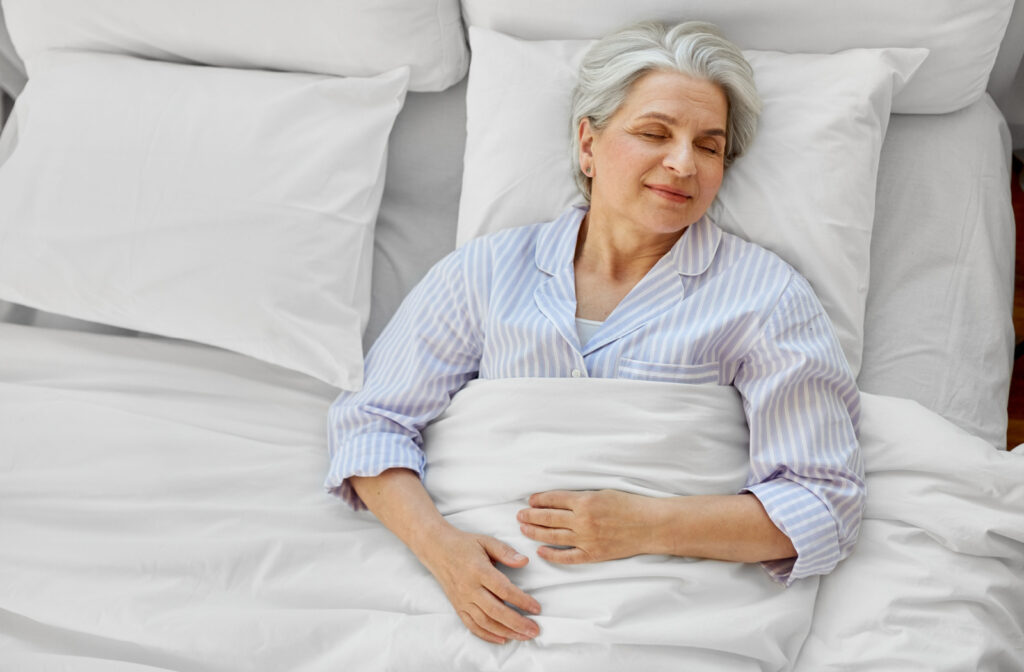Our loved ones can experience changes to their daily routines, including their sleep patterns, as they age. Whether they live alone or in assisted living, you may see them taking naps more frequently during the day or going to bed earlier at night.
Reasons for increased sleep can include health conditions, medications, and disrupted sleep at night. As family members, when parents or grandparents catch more Z’s than they used to, it can raise questions or concerns. While it can affect physical functioning and wellness, understanding the reasons behind this behavior and nurturing healthy sleep habits can lead to better quality and quantity of sleep.
Evolving Sleep Patterns
Experiencing changes to the quality and duration of sleep are common in older adults, mainly due to disruptions in circadian rhythms or the body’s internal clock. As we age, the biological clock that regulates our sleep-wake cycle changes.
Disruptions in sleep at night can cause older adults to feel more tired or sleepy during the day, often leading to napping. While short naps can be beneficial, extended naps in the daytime can cause difficulty falling asleep at night. Moreover, older adults may feel more alert in the morning and tired in the evening, causing them to go to bed earlier.
Natural light provides a cue for maintaining your circadian rhythm. With less exposure to daylight, many older adults may experience poor sleep.
As you age, there’s a decrease in the production of a hormone called melatonin. Melatonin helps regulate your sleep-wake cycle and increases in response to darkness. Low melatonin levels can delay your sleep cycle, leading to sleeping late and causing excessive daytime sleepiness.
Typical age-related changes also affect sleep architecture or how you go through the different stages of sleep, such as more fragmented and lighter sleep with more arousal and awakenings. A decline in total sleep time can result from an increase in the lighter stages of sleep and a decrease in rapid eye movement (REM) sleep.
Reasons Why Older Adults Sleep So Much
Have you wondered how much sleep is too much? Although the amount of sleep needed can vary in individuals, healthy adults 65 and over should get an average of 7–8 hours per night, according to The National Sleep Foundation. Several factors can influence how much you sleep and the overall health of older adults.
Health Conditions
Many health conditions can cause older adults to sleep more regularly. For instance, chronic pain from arthritis or a recent surgery can cause discomfort and disturbance during sleep at night, which results in older adults taking naps to make up for the lost sleep.
Conditions such as depression, anxiety, heart disease, and diabetes, or having multiple health conditions can affect sleep quality. Moreover, conditions like dementia can also result in irregular sleeping patterns because of damage to the areas of the brain that regulate sleep.
Medications
Older adults with underlying health conditions often take multiple medications. These medications may cause drowsiness as a side effect.
Prescription medications, including β-blockers, bronchodilators, corticosteroids, decongestants, diuretics, and other cardiovascular, neurologic, psychiatric, and gastrointestinal medications can all have sedative effects leading to increased sleepiness, lethargy, fatigue during the day, and influence sleep-wake cycles.
For these reasons, it’s beneficial to administer sedating medications before bedtime and stimulating medications and diuretics during the day.
Increased Need for Rest
Your body can begin slowing down as you age and energy levels decrease. Simple chores that were once easy can become tiring for older adults. Therefore, more rest is needed during the day, making them more likely to nap.
Other factors that can make older adults feel tired even after sleeping 8 hours include:
- Sleep apnea: A breathing disorder that causes interrupted moments in breathing during sleep.
- Restless legs syndrome: A brain disorder that causes the urge to move your legs when sleeping.
- Bruxism: Grinding or clenching your teeth during sleep.

Tips for Improving Sleep Hygiene
Improving sleep quality, quantity, and hygiene can involve changes to your environment and behavior. Tips to incorporate these changes can include the following:
- Exercise: Regular exercise and an active lifestyle can help older adults fall asleep faster, sleep longer, and have better sleep quality.
- Reduce bedroom distractions: Electronics and bright lights can make it more challenging to fall asleep. Moving these out of the bedroom and using your bedroom only for sleep can help with healthy sleep patterns.
- Avoid substances that discourage sleep: Avoid tobacco and stimulants, such as tea and caffeine, before bedtime. Consider quitting smoking, reducing caffeine intake, and eating dinner at least 4 hours before bedtime.
- Keep a regular sleep schedule: Try going to bed at the same time and waking up at the same time each morning. Avoid napping too long during the day or too close to bedtime.
- Develop a bedtime routine: Find what activity helps you relax before bed, such as a warm bath or quiet time.
- Speak to your health care provider: Discuss medication management and ask your doctor which medications may affect your sleep.
Better Sleep Better Health
Sleep is an essential aspect of overall health and well-being for older adults. Understanding why loved ones sleep so much can help you provide better quality care. As family members, we can encourage good sleep hygiene, such as maintaining a consistent bedtime, establishing a relaxing nighttime routine, and creating a comfortable sleeping environment.
Book a tour with Meadow View to learn more about senior living and how we can support a loved one.



